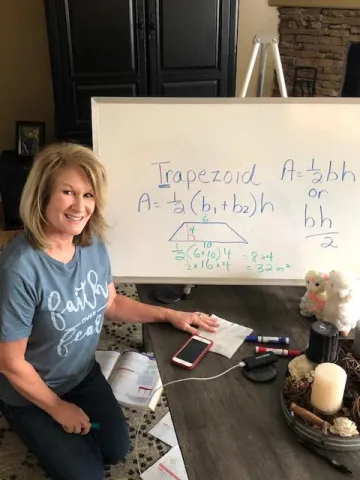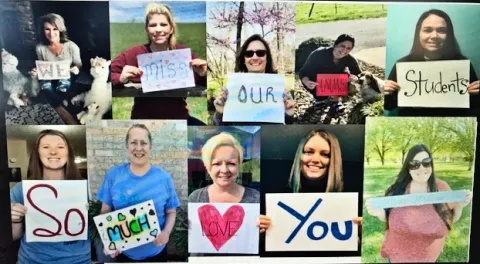Tangent Teaching in Turbulent Times

HMMS 6th grade math teacher Alice Pope prepares for virtual teaching before going online with a lesson. She claims to be a math teacher, but that looks like Greek to me.
Do you know the meaning of each word in this title? If so, you might want to thank a teacher.
Are you a teacher? Do you personally know a teacher? Do you have a school age child who is home from school right now because of Covid-19?
If you answered "no" to any, or all of these three previous questions, there is a good chance you have no idea of the lifestyle teachers in the United States are embracing to keep students up to speed and prepared for when/if school starts back this fall.
This article focuses on schools in Union County, Tennessee, but let me assure you, it is the same with every teacher I’ve encountered across many states.
Someone mentioned the other day that it would be nice to be a teacher during Covid-19 because educators are getting a lengthy holiday with pay. I would like to set that thinking straight.
Yes, most, if not all teachers still continue to get a paycheck; and believe me, they should. Few of us would be willing to make the sacrifice our teachers do on a daily basis. I personally don’t wish to walk a single step in their shoes, much less a mile.
I interviewed (virtually) Alice Pope this week; a Horace Maynard Middle School, 6th grade, math teacher in Union County. She speaks from her own experience, and that of her 6th grade math team at HMMS (Horace Maynard Middle School); and maybe for many teachers across our nation.
Q: Approximately how many hours each day did you spend teaching and preparing to teach before Covid-19?
Pope: Prior to school dismissing as of Monday, March 16, I taught three 90 minute math classes and one 40 minute math intervention class. That time does not include homeroom time of 20 minutes (which consists of school "housekeeping" items, such as daily announcements, school handouts, grade level handouts and announcements, etc) and afternoon bus dismissal consisting of 20 minutes.
There is also a 45 minute planning time during the school day for all teachers and a 30 minute lunch. I generally spend about an hour after school (3:15-4:15) preparing for the next day or week, grading papers, gathering materials for lessons (which I have in my class), etc.
*Total time frame physically AT school was usually 7:45 to 3:15-4:15 (depending on what I needed to finish) so around 7-8 hours daily for 82 students.
Q: How many hours do you typically spend now?
Pope: I/we begin usually by 7:45 to 8:00 submitting online materials to Google Classroom. These consist of typed notes, videos, other worksheets and a quiz all of which we (6th grade math teachers) are currently having to find on line since we cannot go to school and use the resources there. All of that is done the evening or two prior to submitting a particular lesson for students via their google classroom. I am monitoring consistently throughout each day whether students have completed and submitted their daily quiz.
The 6th grade team of teachers (all subjects) are in constant contact "talking" in a group text to monitor students participation in each class. The homeroom teacher of a student who has not been submitting their work consistently will contact that student or students parent/guardian either through a phone call or email. This is an all-day, ongoing process.
We usually don't stop working/monitoring until around 6:00pm. While we may be able to stop for breakfast, lunch or the bathroom whenever needed, we are continually on our Chromebooks watching for students to complete their work, watching for emails, completing daily reports for attendance, checking on students who need meals picked up, and the percentage of students completing/turning in their work.
Afterwards, we conduct the normal activities of grading and adding grades into the grading system. As far as I know, all students should have a Chromebook in their possession at home. The middle school handed out Chromebooks to each student on Friday, March 13 in anticipation of school being called off within a few weeks.
I am trying something new to me this week. I am going to video myself teaching. I have a dry erase board at home that I can use to show students HOW to work some of the math problems I am presenting on line. I hope this works, and I don't absolutely hate it (because I hate hearing my own voice recorded). I hope it provides students with better understanding of the skills being presented.
We are taking "attendance" virtually either through a google form or other means of communication with our students. Attendance is submitted onto a google sheet (I submit mine at the end of the day) for our principal and central office personnel. We are compiling reports on the percentage of students completing their work. This report has to be done and redone as some students will complete their work a day or two after it is sent to them, so this is constantly being updated throughout the week.
*Total time: 8:00 am. to around 6:00 pm, THEN, spending around 1 to 2 hours each evening researching for additional material, videos, etc. to add to their upcoming lessons, then making the quiz to go along with the lesson. Total time anywhere between 8-12 hours each day for 82 students.
Again, there may be some down time during the day, but having to constantly go back and monitor completion of work is an all-day event. I also send a message at the beginning of each week to my three classes (again through google classroom) to say hello, tell them I miss them and love them. Some students have emailed with questions, some just to say hi. There are some students with whom I have a "daily check in" as part of a program implemented at school. I am going to attempt to use Zoom this week so I can actually see my classes/students.
Now we could stop right here and understand how teachers are still actively implementing studies for students and continuing their jobs. But it doesn’t end there for the teachers, so let’s continue.
Q: What is the number one thought that hits you daily since schools closed?
Pope: Not knowing if my students are okay, and I mean REALLY okay. I worry about every single one of my kids emotional, mental and physical health right now. Honestly, I can handle the constant reporting to admin and gathering materials at night, monitoring classwork being completed, but I worry about my kids. Some kids NEED school, and not just for educational purposes.
I'm worried that they're scared and upset and that they might need additional emotional support from someone other than their family. I know their families are telling them it's okay and not to worry, but sometimes hearing that from someone else is helpful.
Q: Do you think it's wise to return to school after the suggested closure through April 24?
Pope: Only if the number of virus cases is consistently decreasing and then maybe on a reduced or staggered schedule.
Q: How would you plan to truly make up the work students are missing? How do you plan on closing the gaps in their learning and teaching those standards they missed?
Pope: Possibly by taking the first month of school (August, or whenever that may be) to teach/reteach those skills and state standards that are currently being taught virtually to our new classes. For example, I would be in conversation with current 5th grade teachers at our elementary schools to ask what they are teaching virtually, what state standards or skills will they need to be taught (those they will miss altogether) or retaught (those they are teaching virtually) and plan on teaching that for the first month. THEN, I would begin with my 6th grade standards and skills as I do every year.
Q: There has been some talk about how to make up the missed skills/standards, etc., and summer school, or extending the school day next year or extending the school year next year. Would you agree with this solution?
Pope: No. I feel that this is a punishment of sorts to the students for something beyond their/our control. On the other hand, it could also be considered a punishment that they're not getting taught what they normally would have. But, again, this is beyond anyone's control. It's a double-edged sword. Let's move on from it. Teachers are smart, students are smart. We will do what we need to do during the normal school year to make up for the lost time.
Add to all of this, those teachers who have SSAH (students stuck at home) of their own now . Those teacher moms are monitoring each one of their children's studies while doing everything Pope has described above for the students they currently teach. My daughter teaches middle school students and has four school age children of her own that she helps navigate/oversee their online studies each "virtual" school day. This adds even more hours of work (at least three each school day) for her and other teachers with school age children at home.
I. Can’t. Even.
Pope says Union County school principals have been extremely supportive of their teachers, as has Central Office.
“I hope this interview helps dispel the thought that teachers are sitting around all day watching soap operas and eating bon bons,” said Pope. “I assure you; we aren’t.”

A virtual show of love from HMMS teachers to their students. The signs read: We miss our HMMS students so much. Love you. quaranTEAM 6thgrade
Front row, L to R: Lindsay Wagganer, Jacqueline Oglesby, Stacie Greene, Sarah Helms, Chelsea Simpson
Back row, L to R: Alice Pope, Jacqueline Funk, Susan Coffey, April LeFevers, Melissa Dykes
- Log in to post comments
teachers
I was a librarian for 35 years. I developed lesson plans and lessons during all but a few of those years. I often spent hours after school making sure my libraries could support the teachers' and students' needs. I was not under the same mandates that classroom teachers were and are, but having been in a classroom for a short time in between library jobs, I have nothing but admiration, respect, and love for all teachers. This is a wonderful article detailing what teachers are doing to take care of 'their' kids. God bless teachers!!
Teachers
Thank you Susan. I have always admired and appreciated teachers for what they do.